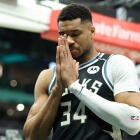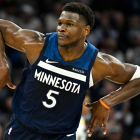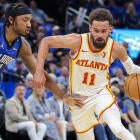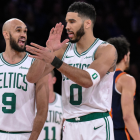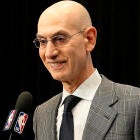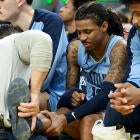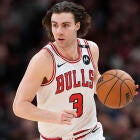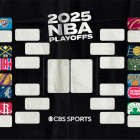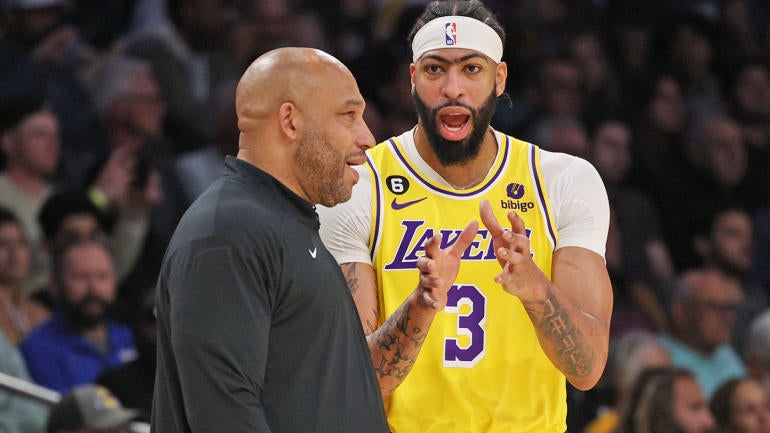
The Los Angeles Lakers have spent the past five years waffling on how much size they've wanted to put on the floor. Anthony Davis wants to play power forward. Every shred of empirical data suggests they should play him almost exclusively at center. Last year's Western Conference finals team was so small that the Lakers largely abandoned the backup center position by the time the postseason arrived. Davis was the only big man on the roster.
Doing so wouldn't have been possible, or at least practical, on Wednesday. Aside from their two-way players, the Lakers were down to eight healthy, active players. Three of them were big men, and two of them, Christian Wood and Jaxson Hayes, were newcomers signed specifically to alleviate Davis' workload and prevent situations like the one that occurred late last season. The Lakers find minutes for both on a normal night, but still start small with Davis at center and, depending on the matchup, could just as easily close small as well.
Of course, Wednesday wasn't a normal night. The Lakers were facing a Clippers team that had beaten them 11 times in a row, and they were doing so shorthanded. With only eight players available, all three of the big men had to play significant roles. That practically guaranteed that Davis would play the bulk of his minutes with one of them on the floor. But in an act of desperation, Darvin Ham attempted something we've never seen before: he played Davis with both of his backup centers.
They say necessity is the mother of invention, and necessity is an understatement here. The Lakers were trailing 80-72 when Ham attempted his gambit, but were in danger of letting the game slip away entirely. LeBron James was heading to the bench for his third quarter rest, and in their first four games this season, the Lakers have lost the James bench minutes by 38 points. Without a home run swing, the Clippers were going to seal this win late in the third quarter.
Instead, the Lakers went on a 15-5 run with their jumbo lineup on the floor, turning that 80-72 deficit into an 87-85 lead at the end of the third quarter. How did they do it? Though they didn't score, the tone was set on their very first possession with the three big men on the floor.
Rebounding was the biggest advantage the Lakers had with all of this size, and they made the most of it during this stretch. The Lakers outrebounded the Clippers 10-5 across the final 4:22 of the fourth quarter. At times, they even made it look easy.
But the name of the game here was defense. The Lakers were betting that, in a short sample with no time to prepare, the Clippers would be so flummoxed by all of that size that they would play sloppy offense. That's largely how it played out. Knowing that both Wood and Hayes were on the floor to offer supplementary rim protection, Davis was able to spend possessions defending both Kawhi Leonard...
And Paul George...
Neither Leonard nor George are frequently defended by big men who can actually move with them, and his length proved troubling to both of them. Even when Leonard did manage to get away from Davis, he not only had to contend with one of his understudies but also the mere threat of the league's most fearsome rim protector jumping back into the play.
Davis affected every Clipper on the floor. Russell Westbrook knows he has no shot scoring on Davis, but Davis is also so long that it affects the angle and trajectory of this ugly pass out. Max Christie is able to step in and steal it, and that allows him the opportunity to get fouled in transition.
Those big plays were the defining feature of the giant lineup. No matter where the Clippers tried to drive the ball, they were swallowed whole by the three mountains they had to climb.
Defense and rebounding are the expected benefits of size, especially when you have a big man as versatile as Davis. The theoretical downside is offense. Were it not for some clutch individual foul-drawing and shot-making out of Austin Reaves and D'Angelo Russell, the offense might have been so bogged down by the way all of that size cramps the floor that it might not have been able to take advantage of how well the defense played. Fortunately, the Lakers weren't using three traditional, plodding interior scorers. Wood provided just enough spacing to make the lineup offensively viable.
When the fourth quarter began, James returned to the floor and the Lakers had the luxury of using more typical lineups. But remember, the Lakers trailed by as many as 19 points in the first quarter. The majority of their comeback came during a 39-24 third-quarter victory, and 10 points out of that 15-point margin came with all three of the big men on the floor. The trio of Davis, Wood and Hayes swung the game.
And given how much trouble the Lakers have had defensively to open the season, it's worth wondering whether or not we'll see this group again. The answer to that is tricky. Aside from the fact that the Lakers will presumably be healthier moving forward, they'll also need to be careful about maintaining the novelty of the group. Part of why this worked was how unexpected it was. Once teams have scouted a problem enough, their coaching staff can typically cook up a solution. This is why zone defenses, especially in the playoffs, are typically used as curveballs rather than as a base system. Once a team solves it, it's no longer valuable.
From that perspective, it's probably not going to become a staple any time soon. The Lakers are deep enough at guard and forward not to need to rely on gimmicks too frequently, and even if the spacing worked out for this stretch, it's going to be iffy most of the time. There's a good chance we won't see this unit for a while, but having seen it once, the Lakers now know that is a weapon in their arsenal. A team can never have enough of those.
![[object Object] Logo](https://sportshub.cbsistatic.com/i/2020/04/22/e9ceb731-8b3f-4c60-98fe-090ab66a2997/screen-shot-2020-04-22-at-11-04-56-am.png)









